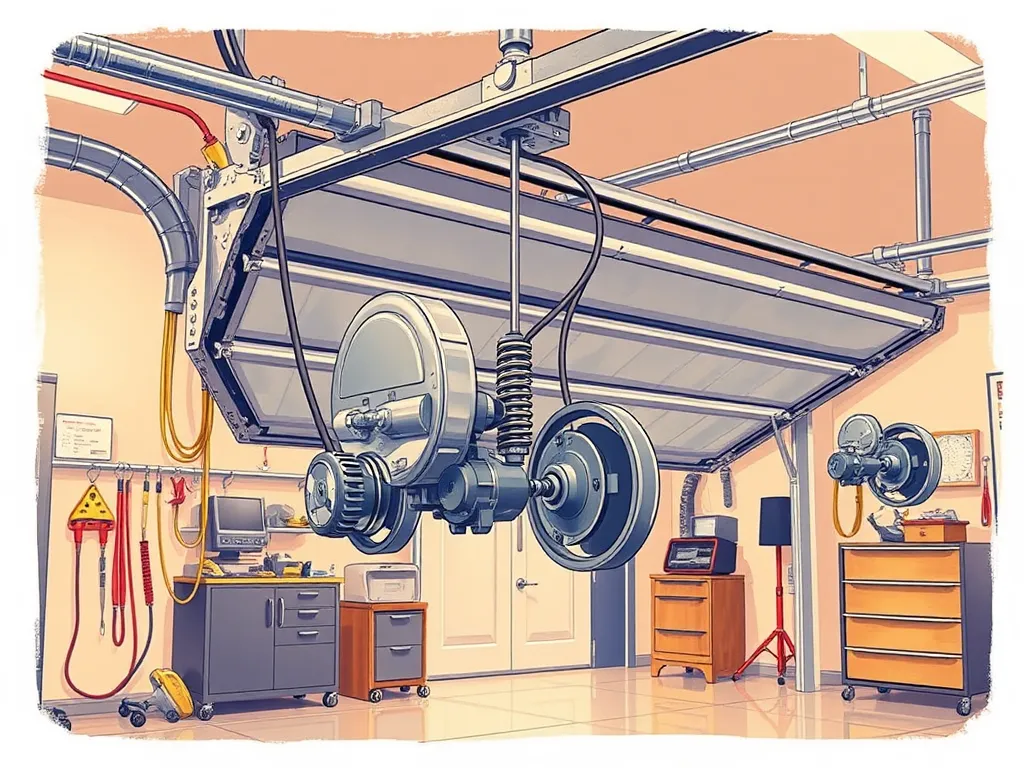Maximize Safety: Benefits of Regular Tension Adjustment for Garage Doors

Garage Door Maintenance: Essential Tips for a Safe and Functional Garage Door
Garage door maintenance is crucial for ensuring safety and functionality in any home with a garage. Regular maintenance not only prolongs the lifespan of the garage door but also prevents potential accidents and costly repairs. By focusing on components such as the door springs, rollers, and tracks, homeowners can enjoy peace of mind knowing their garage door operates smoothly and safely.
One of the key aspects of garage door maintenance is regularly checking for wear and tear. This includes inspecting the door's springs, cables, and hardware for signs of damage. Garage doors are heavy, and if components wear down or break, it could lead to serious accidents. Thus, a proactive approach to garage door maintenance helps catch issues before they escalate, ensuring a functional and safe door for daily use.
Seasonal changes can significantly affect the performance of a garage door. For instance, extreme temperatures can cause lubricants to thicken or evaporate, leading to a decrease in operational efficiency. Regular garage door maintenance, including lubrication and hardware checks, keeps the door functioning optimally throughout the year. Additionally, adjusting the tension of the door springs is essential for balanced operation, as improper tension can cause the door to behave erratically.
Homeowners should schedule at least once a year for professional garage door maintenance. Technicians can spot problems that may go unnoticed during routine checks. In addition, they can provide tension adjustments on door springs, ensuring that the garage door operates smoothly and safely. By investing in proper maintenance, homeowners can avoid costly repairs and replacement while enhancing their garage door's longevity and reliability.
A well-maintained garage door ensures a smooth operation, allowing for seamless access to your home.
In conclusion, garage door maintenance is an essential practice for every homeowner. By being proactive about inspections and repairs, you can ensure a safe, efficient, and long-lasting garage door. Whether through DIY maintenance tasks or hiring a professional, the investment in time and effort will pay off in terms of safety, functionality, and peace of mind.
Safety Improvements: Enhancing Your Garage Door's Safety
Proper tension maintenance is vital for enhancing garage door safety. If the tension in the springs is not correctly set, it could lead to the door closing too quickly or not closing fully, posing a risk of injury or damage. Regular checks and adjustments can prevent these issues, ensuring that the garage door operates as intended and safely.
Modern garage doors feature designs that provide substantial energy savings, minimizing heat loss and lowering utility bills.
Regular tension checks are crucial in preventing accidents. If the tension is too loose or too tight, it can affect the door's operation. A door that falls unexpectedly can cause serious injuries. Therefore, homeowners should make it a habit to inspect their garage doors to catch any tension issues before they lead to dangerous situations.
Investing in high-quality materials leads to significant reduced wear on garage doors, enhancing their longevity and performance.
In emergency situations, having the right tension in the garage door springs becomes critically important. If a power outage occurs, a door with the correct tension can be opened and closed manually, ensuring that the garage remains accessible. Poorly adjusted tension can make this process difficult or even impossible, thereby risking entrapment or inconvenience during crises.
Increased Longevity: Extending Your Garage Door's Lifespan
Tension adjustment extends the lifespan of a garage door because it prevents the door from operating under undue stress. Correctly balanced tension allows the door to open and close smoothly, reducing wear on components. Regularly scheduled checks will help ensure that the tension remains within optimal levels, leading to fewer repairs needed over time.
Preventative maintenance is essential for long-term use of garage doors. By routinely inspecting and maintaining the door, homeowners can identify issues early on, avoiding more significant problems that require expensive repairs or replacements. This proactive approach to maintenance significantly enhances longevity.
Through proper tension adjustment and consistent maintenance, homeowners can save money on repairs associated with wear and tear. A well-maintained garage door is less likely to require costly parts replacements and repair services, making it a cost-effective investment in the long run.
Operational Efficiency: Improving Your Garage Door's Functionality
Improving operational efficiency often starts with tension adjustments. An adequately tensioned garage door operates more smoothly and reliably, which enhances the user experience. Homeowners should notice fewer disruptions when opening or closing their garage, which can be critical for daily routines.
Identifying signs of improper tension is vital for maintaining a functional garage door. If the door appears to be off-balance, moves slowly, or makes unusual noises during operation, it might indicate a tension problem. Prompt action can prevent more serious issues down the line.
Reducing noise and wear during operation is another benefit of maintaining proper tension. A garage door that functions smoothly will produce less noise and require less force to operate, which in turn prolongs the life of the opener and other mechanical components.
Professional Maintenance vs DIY: Choosing the Right Approach
Homeowners should know when to call a professional for tension adjustments. While some tasks can be handled independently, other adjustments require expertise and specific tools. A professional can ensure that the door is safe and balanced, especially regarding spring tension, which can be dangerous if mishandled.
Safety concerns should always be considered when opting for DIY garage door adjustments. Garage doors are heavy and can cause injury if mishandled. Moreover, springs that are too tightly wound can snap and create serious hazards. It is imperative to prioritize safety and know when to involve a professional.
For those considering DIY garage door maintenance, certain tools are necessary. Basic tools such as a wrench set, screwdrivers, and a ladder are required for routine checks. However, understanding the limitations of DIY repairs is crucial, and having the right tools does not replace the need for professional expertise in critical areas, especially tension adjustments.
Understanding Tension Mechanics: The Basics of Garage Door Systems
Understanding the basics of garage door tension systems is fundamental for effective maintenance. Most garage doors use either torsion springs or extension springs to manage tension. Each system has its unique mechanics and requires different maintenance approaches to remain functional and safe.
Garage doors can employ different types of tension systems, including single spring systems, dual spring systems, and continuous cable systems. The type of system influences how the door operates and what maintenance is required to keep it functioning optimally.
How tension affects door balance and operation is crucial for understanding garage door functionality. Properly balanced tension allows the door to open and close evenly, preventing excess strain on various components and enhancing overall safety and ease of use.
